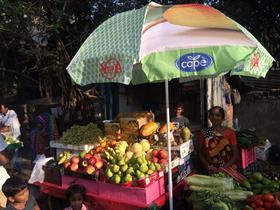
Global fresh produce group Capespan acquired a 35 per cent stake in Mumbai-based importer-distributor Yupaa earlier this year. Fresh from striking their strategic alliance, the two companies last month teamed up on the first-ever promotion for South African-grown Capespan pears in India. Yupaa’s head of global procurement Parth Karvat talks to Asiafruit about the promotion.
How did your Capespan South African pear promotion come about?
Parth Karvat: India has in recent years become an increasingly important market for South African pears. We’re noticing a rise in the import volumes season after season. In such a scenario it becomes important for customers to identify and associate with a reputed brand and for importers to build loyalty for their brand. Yupaa has been representing the Cape brand and distributing Capespan pears for over 12 years now. So it is good timing on the one hand to promote our respective companies and our recent association that will add value to all our customers, and on the other topromote and push the brand we are selling.
When did the promotion take place and what activities did it involve?
PK: It took place in the last week of March. The promotional activities were focused at the wholesale market level. Each wholesale shop displayed an LCD TV screen showing Cape pears being harvested and packed in South Africa. During the promotional period, buyers received caps and t-shirts as hand-outs with the first purchase and the shops were decorated with Cape-brand posters, banners and umbrellas.
How extensive was the promotion in terms of the number of wholesalers and cities or regions covered?
PK: The promotion activities were conducted in Mumbai. Yupaa has eight to 10 wholesalers as its main customers in the wholesale markets who handle South African pears. So the impact of the promotion reached different parts of the city as well as other cities across the state and smaller cities in neighbouring states. That’s because retailers from Mumbai and wholesalers from other cities buy South African pears from Mumbai market (Nhava Sheva in Mumbai being the port of entry). Besides these activities a lot of promotional materials were distributed to our wholesale customers in other cities/regions with their purchases of Cape apples and pears. Since all promotional materials were ultimately intended for, and given to, the retailers, it created brand awareness and recognition of Cape fruit amongst them.
Who were the chief targets of the promotion i.e. street vendors and what were seeking to convey to them?
PK: The chief targets were the retailers, be it street vendors or other retail formats: the rationale being that it’s their collective demand for the brand which translates into wholesaler or market demand for that particular brand. Like I mentioned we have been in the market selling Cape fruit to wholesalers with them in turn selling to retailers for many years. But the intention now is that they identify the brand and build loyalty towards it.
What were the results or outcomes of the promotion?
PK: The results were very positive and measurable too. We saw record sales figures during the period of the promotion. Our idea of having LCD screens set up in the market with videos being played to show what the fruit goes through right from harvest to shipping was unique. It’s never been done before and it was intriguing for the city retailers to see and observe the actual source of what they sell everyday. The caps, t-shirts and umbrellas for their stalls gifted to them with every purchase were really valued by all of them. Especially because it's a hot summer here in India now.
How would you describe the trade and consumer recognition of the Cape brand in India currently compared to say Washington Apples?
PK: Since Yupaa has been marketing and distributing the Cape brand for many years now, there’s already a good level of trade and consumer recognition of the Cape brand in India. It's been around long enough for retailers to have seen it, bought it and recognise it. Up until now though, we haven’t publicly promoted it or carried out any promotional activities. The branding and promotion of the Cape fruit was more on a B2B level. Now it's about building loyalty and not just recognition. Since South African fruit is more seasonal in nature and is traded only for few months of the year while the season lasts, it cannot be compared to something like Washington apples that have year-round sales and therefore need appropriate promotional activity.
What kind of volume of South African pears is Capespan (and the industry) shipping to India? How is it growing and what are the key opportunities and challenges to expansion?
PK: I do not have the exact numbers but it's surely growing season after season. The key opportunity is that there is almost no competition from any other Southern Hemisphere pear producing countries and the number of Indian consumers with disposable incomes is increasing in all cities, including second- and third-tier cities. I don't see any challenges to expansion.



